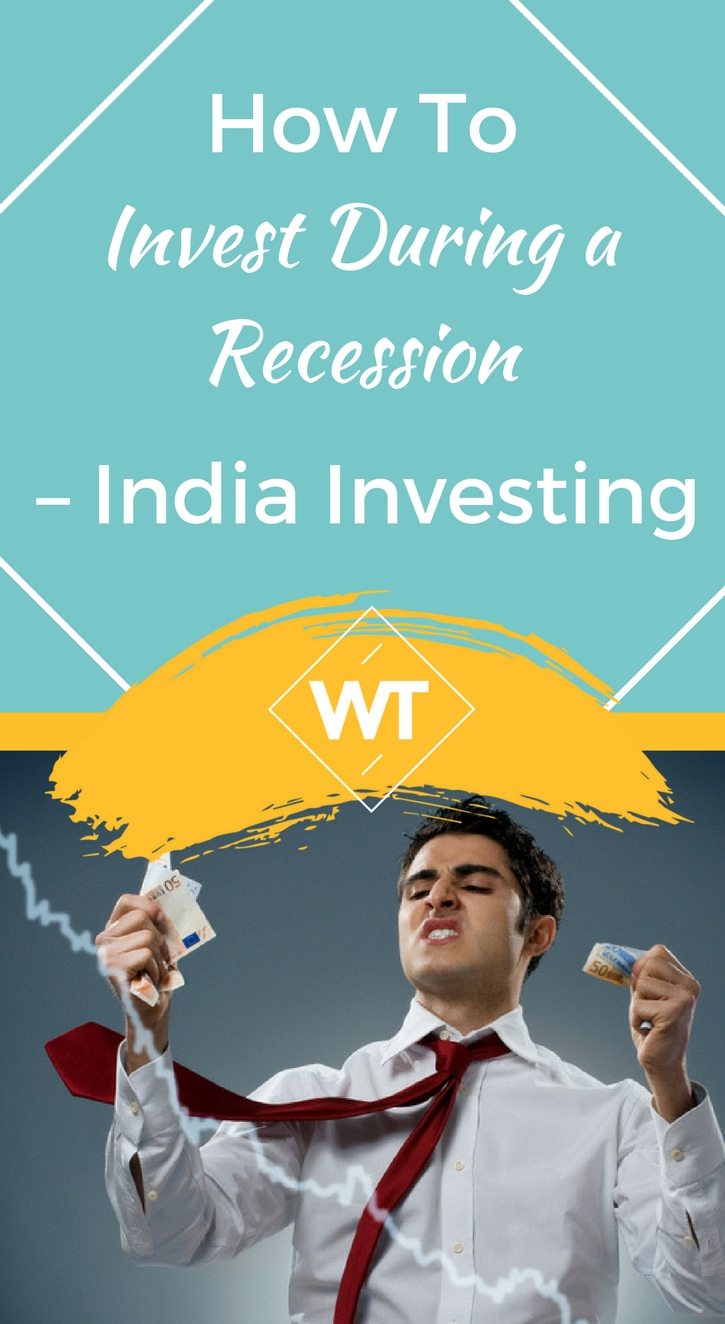How to Invest During a Recession – India Investing

How to invest during a recession? Is that even a sane thought? Way back in 2008 there was talk of global economic crisis everywhere – in the office, at home, at coffee joints, bus stations, airports, malls, etc. It was quite common to see the big bears of the market on television telling us that the worst is yet to come.
There was a feeling that the world is gradually sinking further and further without any hope for recovery. On the other side there were optimists who said that this is the best time to pick investments at attractive prices. Lets not debate about who is right or wrong, but see how to invest during a recession
Who’s Buying?
When people were selling their stocks and emptying their portfolios in late 2008, who were buying those stocks? This is a question which one has to ponder over. If you sell your stocks, obviously someone else is buying. Right? People who bought during recession are the ones who doubled their investment values over a period of just 1 year or so.
Some of the stocks were available at 52 week lows, some at 3-4 year lows and some at life time lows. Even the fundamentally strong stocks such as SBI, Tata Steel, ITC, etc had come down.
Priorities during Recession
1. In normal economic circumstances one needs to have atleast 3 months worth of living expenses in readily accessible cash or bank accounts.
Beyond this one can think about investments both short term and long term. But when recession strikes or seems to be nearing you need to increase your emergency funds to atleast 6 months living expenses. This is the first step to take care of daily needs of your family in case of any eventuality such as job loss.
2. The next step is to cut down on discretionary expenses.
For instance you should try to cut down on thing like eating out, entertainment, travel, vacations, etc. Similarly use your savings or income to pay off all debts – whether it is a credit card or car loan or personal loan, etc. The only loan that you can have is a housing loan.
In other words tough times call for tough actions. Unnecessary expenses such as buying brand new gadgets, expensive clothes, cars, etc is strictly not recommended. Ofcourse you cannot and should not try cutting down on essentials such as food, basic clothing, normal entertainment, basic amenities, etc. You need to minimize on things that you can live without.
3. Once the first two priorities are taken care you will have some funds left to invest for the future.This is where you need to plan and start investing gradually.
During late 2008 some of the fundamentally strong stocks were at all time lows. I am not going to give you statistics because even the most reliable forecasts and estimates given by analysts miserably failed during the economic phase in 2008 and 2009.
At one point Goldman Sachs forecast Crude Oil to touch $200 per barrel which never happened, instead it steeply went in the opposite direction to touch $30 per barrel. So lets not rely on the so called ‘expert forecasts’. Instead you should focus on investing small amounts in fundamentally strong companies or simply buy the index ETF whenever market falls.
For those who are investing in index ETF, it may be a good idea to buy some Gold ETF as well because Gold is resilient during recession. Gold prices too will fall or see bad phases during recession, but since it is a safe haven investment, people will rush to buy more when news such as Lehman Brothers’ bankruptcy creates a lot of fear and pessimism in the markets.
How to Invest During a Recession – What to buy/sell
Lets take the example of Infosys which is trading at Rs.2780 level and assume that brokerage are giving a buy call and markets are optimistic. One find day due to market pessimism the stock plunges to Rs.2,400. What do you do assuming the company is fundamentally strong? Obviously buy at Rs.2400.
But in reality this does not happen because during recession people feel prices are going to fall further. They wait for prices to bottom out, which is also known as ‘bottom fishing’.
Buy fundamentally strong stocks
The example of Infosys give above applies here as well. However, its better to avoid the mid cap and small names that are unknown, because when companies with strong track record and brands are available at low prices, why should you take undue risks?
If you buy the large companies with strong business models you will find them bouncing back as soon as the economic conditions gradually improve. Moreover, institutions or the smart money will first chase the big index heavy weights and large caps. This is where you have safety for the medium to long run. If you run after small names to make a quick buck you may end up losing more.
Limited Averaging (only for ETFs and Index Stocks)
People who bought Nifty ETF should try to diversify in to Gold or other assets classes and buy a few more Nifty ETFs to reduce their average costs. If you are in need of urgent funds then a sale is inevitable, however, in all other cases a wait and watch approach is the best feasible option.
Generally any financial expert or writer will not recommend averaging or buying more stocks at lower level to average your costs. However, you can do this in a limited way for Index ETFs and index stocks that are fundamentally strong.
Buying some quantity at lower levels helps, but don’t go overboard by buying a huge chunk in order to average your costs, because the future is uncertain and you are not sure if the prices have bottomed out or if there is further correction yet to take place.
Investing in a Property
The biggest secret of many millionaires is their ability to strike the best deals at the right time. Most of the good opportunities in property market are available in tough market conditions and requires a lot of patience to negotiate and get the best deal.
Lets take the example of residential apartments in cities such as Bangalore and Chennai. At one point in 2007 there were not many 2BHK units available in the Rs.25 lakh budget, but in late 2008 there were plenty of inventory available in the Rs.20-30 lakh range that were finished and ready to occupy.
The same units that were worth Rs.25 lakhs in late 2008 were worth Rs.33 lakhs or more after a year, which is an increase of more than 30%. However, once the economy stabilized the increase in prices will be more normalized or moderate. This is partially true for property rents as well.
Generally, when you think of investing in a property during recession two conflicting schools of thought arise –
- Invest since prices are low and reasonable
- Wait for further correction before investing
Both ideas are fine as long as you don’t procrastinate and miss the opportunity. If one goes by case 2) and waits for several months, then he/she might lose the opportunity as the property inventory gets depleted when the economy recovers. Remember, that in property market negotiation and research are important. If you do a lot of research and compare properties you will know the true and fair prices. When you meet the developer or broker try negotiating based on facts and ask for discounts.
Gold ETF
Precious metals are a good investment during recessionary phase due to their safe haven status. But the best mode of investment is through ETFs. If you go by the traditional mode of buying jewelry, coins, etc. then probably you will have to shell out extra charges for storage, margins, etc.
Commodity Stocks
Stock in the commodity spectrum can dip to rock bottom levels during recession. Examples could include stocks involved in oil exploration, base metal mining, etc. For instance if you find stocks such as Reliance Industries, Cairn, etc moving to low levels during recession, I am not saying you should buy them immediately. Do some research on how their business would be affected – whether it is going to be a temporary bad phase or a much bigger issue.
If this is going to be a phase spanning the next quarter or so, its worth buying because oil prices will recover gradually as economy is back to normal. Similarly you can pick stocks in sectors such as iron and steel, copper, aluminium, coal, etc. Some examples include Tata Steel, Sterlite Industries, Coal India, etc.
Factors to consider
Except for real estate which is for long term investment, in all other cases you need to look at the following factors while investing. These factor a prime criteria in your quest for “how to invest during a recession”
Liquidity
This is very important because you may have unforeseen needs during recession. Short term bank deposits, stocks, ETFs, etc are flexible and highly liquid.
Investing in Phases
Whether it is stocks or ETFs or mutual funds make sure that you invest in phases because prices may fall further and disappoint you.
Additional Funds
If you find that there are not many options to invest, just park your funds in a Gold ETF or a fixed deposit. These two investments are generally best places to park your funds until you find other opportunities
Selling Out
Sell out investments which are hopeless or not expected to recover in the next 6 months. This applies to stocks that have lost a lot of money and are melting your capital. Quick action will ensure that you get something substantial before the next fall occurs. This also calls for tough decisions which should not get influenced by emotions or greed.
Conclusion – How to Invest During a Recession
If you carefully look at various asset classes during recession you will find that recession is the best time to invest. Interestingly, recession is a blessing in disguise provided you have your emergency funds and needs taken care of. However, don’t get in to the temptation of investing all your money at one go.
It is important to invest in phases so that you can get the benefit of different price points. Sometimes you may not get the bottom or low prices but still it makes sense to invest at marginally higher levels in stages, because once recovery stakes place most assets will turn expensive. Investing should be a gradual and systematic activity like a systematic investment plan instead of being a one time action.
Having understood how to invest during a recession and its benefits, don’t get in to the temptation of waiting for recession to time your investment. Instead try to invest systematically and invest more whenever you find small phases of correction. A regular and consistent investment plan will give you the benefit of compounding and make your investment work harder for your future.









Leave a Reply